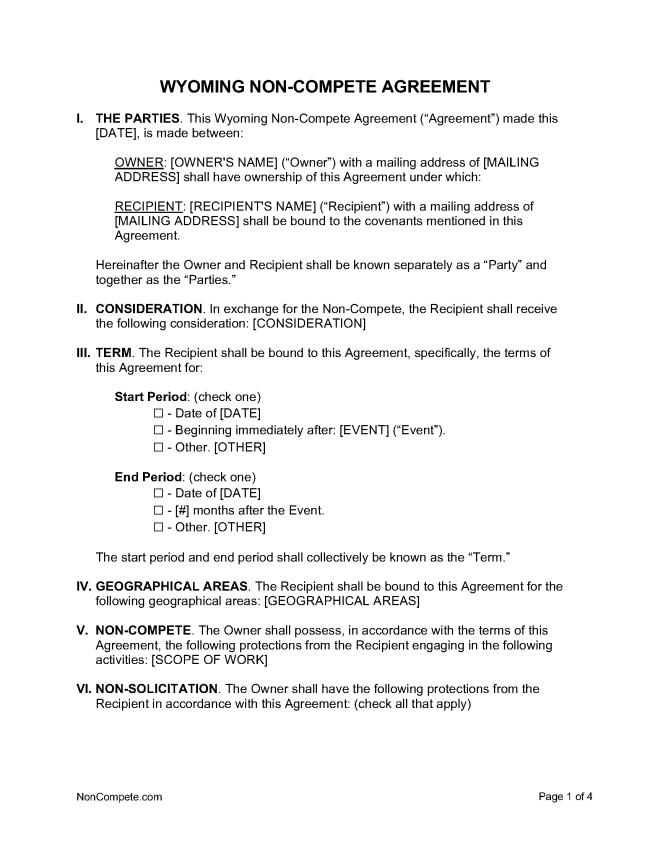A Wyoming non-compete agreement is a contractual clause that limits a person’s ability to engage in competitive activity with a business. As contracts in restraint of trade, non-compete agreements are generally disfavored by Wyoming courts—especially those restricting an employee’s freedom to continue in their profession. But subject to certain requirements, non-compete agreements that are necessary to protect a business from unfair competition may be enforceable.
Table of Contents |
Are Non-Competes Enforceable in Wyoming?
Non-compete agreements can be enforceable provided that:
- The agreement is in writing
- The agreement is part of a broader transaction or relationship
- The agreement is supported by consideration
- The agreement is reasonable as to time and geographic limitations
- The agreement does not contravene public policy
Reasonableness
A non-compete agreement must be reasonable in view of the complete circumstances surrounding the relationship or transaction, including:
- The specific protection needed for the enforcing party
- The level of hardship imposed on the restrained party
- The countervailing public interests in freedom of trade
In non-compete covenants connected with employment relationships, courts will look at additional factors to determine the burden enforcement would place on the employee. These may include:
- Inequality of bargaining power between the parties
- Whether the employer acted in good faith
- The family, life background, health, and other needs of the employee
- The nature of the employee’s position
- The employee’s career prospects
Brown v. Best Home Health & Hospice, LLC (2021)
Legitimate Interests
Businesses are not allowed to create contractual clauses for protection against “ordinary competition.” (Hassler v. Circle C Res. (2022)). Non-compete agreements can only be used to narrowly protect the legitimate interests of a business, in compliance with reasonableness standards and other requirements:
- Trade secrets (Wyoming Trade Secrets Act § 40-24-101)
- Confidential information (Brown v. Best Home Health & Hospice, LLC (2021))
- Customer relationships and contacts Dutch Maid Bakeries v. Schleicher (1942))
- Good will in the sale of a business (Ridley v. Krout (1947))
Attorneys (prohibited)
Terminating an Employee
A covenant not to compete remains enforceable against an at-will employee who is fired unless the employer terminates the employment in bad faith. (Hopper v. All Pet Animal Clinic (1993), overruled on other grounds by Hassler v. Circle C Res. (2022)).
Burden of Proof
Continued Employment (consideration)
Additional consideration beyond the continuation of employment is not required to uphold a non-compete agreement. (Preston v. Marathon Oil Co. (2012))
Maximum Term
There is no statutory or judicial rule concerning term limits in non-compete agreements. The duration of the agreement must be reasonable given the circumstances and necessary for the protection of the business. In Ridley v. Krout, a seven-year covenant was held unreasonable and unenforceable. Term limits from one to three years are more common.
Blue Penciling (prohibited)
If the terms of a non-compete are found to be unreasonable, Wyoming courts will no longer use the “blue pencil” rule to modify and partially enforce the agreement. (Hassler v. Circle C Res. (2022))
